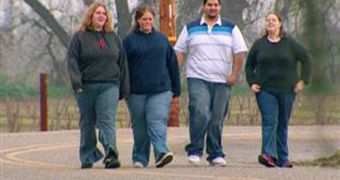The old vision, according to which obesity is a disease that a person brings upon his or herself or is born with is starting to be complemented by a new way of looking at the condition. According to a new study released on Monday, the parents' eating habits are of paramount importance in the teens' diets as well. That is to say, if mom and dad eat more servings of fruit and vegetables per week than the average, their offspring will most likely follow suit. Conversely, when parents consume fast food products and soda as their main meal, the children are more likely to do the same.
The "Teen Dietary Habits Related to Those of Parents" paper, released by the UCLA Center for Health Policy Research, also says that only 38 percent of Californian teens eat five or more servings of fruit and vegetables per day on average, as opposed to 62 percent of those who drink soda and more than 62 percent who consume fast food products, such as various burgers and hot dogs.
The large number of fast food restaurants in most large cities, coupled with peer pressure and other environmental factors, triggers such massive levels of consumption, from which only the restaurants benefit, as obesity causes shame and humiliation for teens at school, where everyone makes fun of them, sometimes in cruel ways.
"The research shows us that one of the keys to solving the teen obesity crisis starts with parents, but we must also improve the abysmal food environments in many low-income communities. While parents are the primary role models for their children and their behavior can positively – or negatively – influence their children's health, it is also essential that local officials representing low-income communities work to expand access to fruits, vegetables and other healthful foods," California Endowment president and chief executive officer Dr. Robert K. Ross said.
The researchers also emphasized the importance of teens being offered an alternative to fast food restaurants, such as farmers' markets, supermarkets, and other types of retail food outlets, where they could buy healthy food from, instead of subjecting themselves to the dangers of fast food.
However, all these measures just avoided the root issue, scientists maintained, namely the inflexible work hours, which were the main reason why most families consuming fast food did not have the time to cook their own meals. Once the people come home exhausted from work, the last thing they need is to spend a few hours in the kitchen, preparing an evening meal. And therein lies the problem. As long as the work hours stay intact, this trend will not be reversed, regardless of other measures that may be employed.

 14 DAY TRIAL //
14 DAY TRIAL //